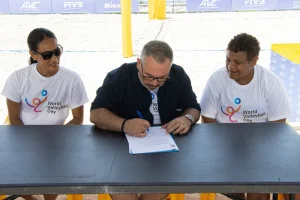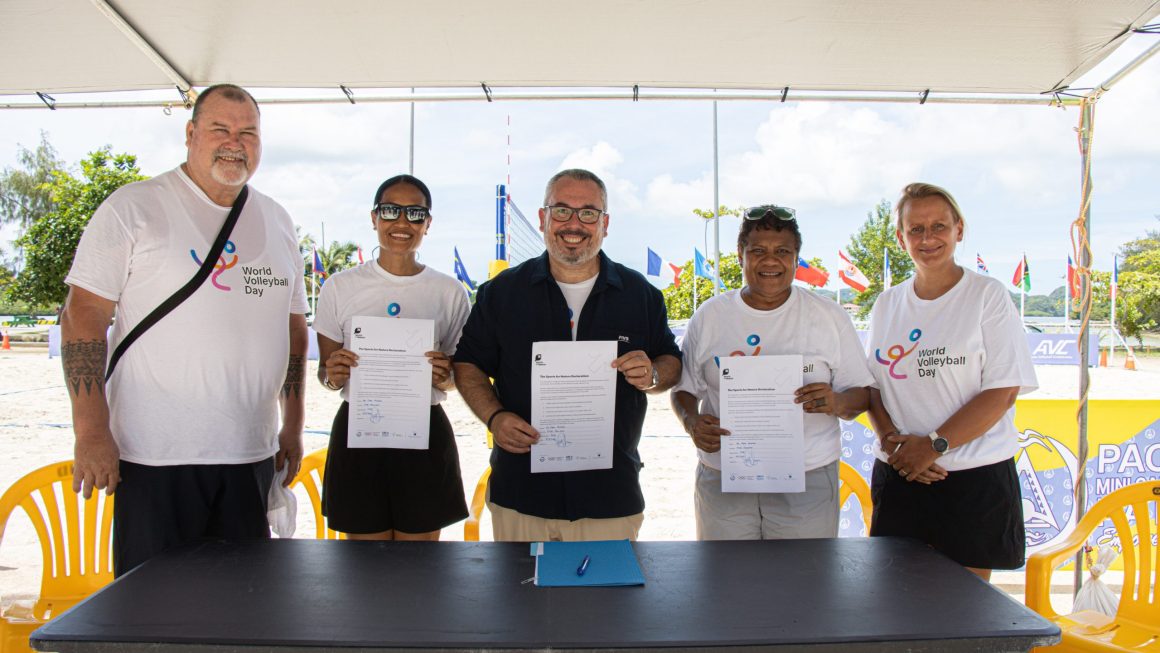In the presence of the IOC Member and ONOC President, Baklai Temengil, the FIVB President signs a landmark pledge for biodiversity and sustainability in sport
Guided by the FIVB Strategic Vision 2032, the FIVB has taken a decisive step in its sustainability journey by officially signing the Sports for Nature Framework, becoming part of a growing global movement to protect and restore biodiversity through sport.
The signing took place in Palau, a country internationally recognised for its pioneering leadership in marine and environmental conservation. The ceremony was held in the presence of Baklai Temengil, President of the Oceania National Olympic Committees (ONOC) and Member of the International Olympic Committee (IOC), whose longstanding commitment to both sport and nature made her presence especially meaningful.
“The FIVB is committed to the sustainability journey as part of the FIVB Strategic Vision 2032. It is very symbolic to sign this framework here in Palau, the country that embodies what it means to live in harmony with nature,” said FIVB President Fabio Azevedo, who signed the framework on behalf of the organisation. “By taking this step, we reaffirm our responsibility to lead with purpose – for volleyball, for the planet and for future generations.”
Palau is home to one of the world’s largest marine sanctuaries, covering 80% of its exclusive economic zone. The country has long championed sustainability on the global stage, from its climate diplomacy at the United Nations to its grassroots environmental education efforts. Signing the Sports for Nature Framework in this unique setting underscores the FIVB’s recognition of nature as both a shared heritage and a responsibility.

ONOC President and IOC Member Baklai Temengil stated:
“Palau’s development journey is rooted in the belief that the well-being of our people is inseparable from the health of our natural environment. The FIVB’s decision to sign the Sports for Nature Framework here honours that principle and affirms the power of global partnerships for sustainability. Palau embraces the sustainability and the SDGs at every level of society, and sport is a key driver of this. So today, we celebrate a sport standing for nature and a shared commitment to leave no one behind.”
The Sports for Nature Framework was developed through a partnership between the International Union for Conservation of Nature (IUCN), IOC, United Nations Environment Programme (UNEP), the Secretariat of the Convention on Biological Diversity (CBD) and the Dona Bertarelli Philanthropy.
Julie Duffus, IOC Head of Sustainability, commented:
“At the IOC, we believe that sport must be a driver of positive change for people and the planet. The FIVB’s commitment to the Sports for Nature Framework is a strong reflection of that belief in action. By embedding biodiversity and nature protection into volleyball’s global platform, the FIVB is helping to deliver on our shared vision to build a better world through sport and to contribute to global sustainability efforts.”
The framework provides a clear roadmap for sports organisations to take measurable, transformative action for nature across four core principles:
1. Protect nature and avoid damage to habitats and species
2. Restore and regenerate nature wherever possible
3. Reduce risks to nature in supply chains
4. Educate and inspire positive action for nature within and beyond sport
The framework complements the UN Sports for Climate Action Framework, which the FIVB is also preparing to join, reinforcing its comprehensive approach to environmental responsibility.
The signing marks the first public communication of the FIVB’s long-term sustainability strategy, anchored in the Strategic Vision 2032. Signing the framework reflects the organisation’s belief that volleyball must respond to today’s most urgent global challenges – including climate change, biodiversity loss and social inequality – with integrity, inclusion and collaboration.
The Sports for Nature Framework signing initiates a three-phase implementation process for the FIVB:
• 2025: Laying the groundwork – aligning with global frameworks, building internal capacity and piloting initiatives
• 2026: Assessment and analysis – governance structures, impact evaluation and stakeholder engagement
• 2027 and beyond: Target-setting and integration – rolling out initiatives across operations and reporting transparently on progress
Volleyball and beach volleyball events will serve as leading platforms to demonstrate how the sport can reduce its environmental footprint while creating new opportunities for nature-positive engagement and education.
The FIVB’s Sustainability Pledge outlines core commitments to:
• Environmental responsibility
• Equity and inclusion in sport
• Transparency and collaboration
• Creating lasting positive legacies through events and partnerships
This signature is just the beginning. The FIVB now calls on the Global Volleyball Movement – National Federations, athletes, fans and partners – to unite in shaping a sport that supports the well-being of both people and the planet.
“Volleyball is played and loved by more than 800 million people worldwide,” said Azevedo. “That reach comes with responsibility. Let’s use our voice, our values and our global platform to stand for nature.”
To explore the Sports for Nature Framework, visit www.sportsfornature.org
QUICK LINKS
AVC Website: click www.asianvolleyball.net
AVC Facebook: click https://www.facebook.com/avcasianvolleyball
AVC Twitter: click: www.twitter.com/AsianVolleyball
AVC Instagram: click: https://www.instagram.com/avcvolley/?hl=en
Mikasa Instagram: click: https://www.instagram.com/mikasasports_official
AVC Youtube: click: Asian Volleyball Confederation
AVC WeChat: Asian Volleyball Confederation

